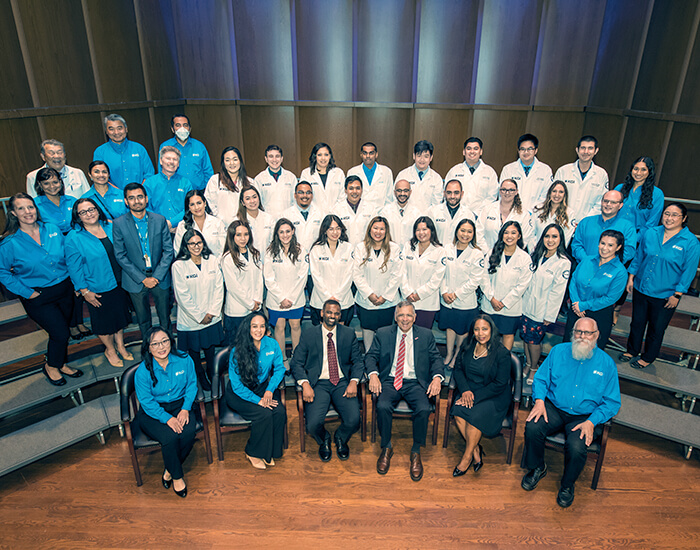Keck Graduate Institute’s Doctor of Pharmacy (PharmD) program is now opening enrollment to international students, marking a shift from its previous policy of only accepting domestic applicants. Such a change provides new opportunities for international students pursuing careers in pharmacy in the United States and enriches the field in multiple ways.
In 2003, the National Association of Boards of Pharmacy eliminated the eligibility for Bachelor of Science in Pharmacy (BS Pharm) graduates to practice pharmacy in the U.S. without a PharmD degree.
“The bachelor’s in pharmacy used to be a very popular program internationally,” said Dr. Srikanth Kolluru, Interim Dean and Professor for KGI’s School of Pharmacy and Health Sciences (SPHS).
International students could take the Foreign Pharmacy Graduate Equivalency Examination Certification, which ensures their education meets comparable requirements to PharmD graduates from U.S. pharmacy schools and become eligible to practice pharmacy in the U.S. However, after the 2003 measure, many foreign citizens with only a BS Pharm were rendered ineligible.
“As a result, many countries started to form PharmD programs, but the pharmacy practice is quite different in other countries,” Kolluru said. “So even though they’re receiving the PharmD degree, they may not necessarily be able to practice in the U.S.”
Thus, many immigrants must complete a PharmD program at a U.S. school if they wish to practice pharmacy in the U.S.—even if they already obtained a PharmD in their native country.
“At a handful of U.S. pharmacy schools, foreign pharmacy graduates can get a one-year waiver, but that means they’re still required to complete three years of the program—after they already graduated from a pharmacy program in their home country,” Kolluru said.
KGI’s PharmD program has opened up a new pathway for international students, eliminating many obstacles. They do not have to complete a pharmacy program in their native country or earn a bachelor’s degree to be accepted into the KGI program.
After completing high school (through 12th grade), they only need two years of pre-pharmacy curriculum—including general chemistry and biology courses—to apply. This puts them on a level playing field with their U.S. classmates and saves them the time and expense of completing years of credits which they would likely have to redo any way.
One of KGI’s motivations for making this change is to foster a more inclusive admissions process, encouraging diversity at the national and global levels.
KGI is creating affiliation agreements and initiating conversations with multiple countries, including India, Vietnam, and Saudi Arabia. Saudi Arabia intends to send its students to pharmacy schools in the U.S. so they can return to their home country to practice pharmacy to change the pharmacy practice within Saudi Arabia.
“This is a win-win situation where these international students can receive a pharmacy education in the U.S., and, in turn, we can help change the way pharmacy is practiced in these other countries so that they are in line with the pharmacy practice in North America,” Kolluru said. “Many countries want to create this shift where pharmacists are trained to be healthcare providers who care for patients and not simply pill dispensers.”
Kolluru would also like to see this shift in his home country of India.
“When I went to pharmacy school in India, the only pathway I was aware of was becoming a medical representative to promote the marketing of drug products,” Kolluru said. “Even today, pharmacists do not typically interact with patients.”
The goal is to teach pharmacists on a global scale how to work as a member of a healthcare team, which includes making recommendations to improve patient outcomes. Kolluru believes that KGI’s PharmD program is uniquely positioned to help advance this goal.
In addition to offering a traditional pharmacy curriculum, the program offers courses and certificates in non-traditional healthcare fields, including informatics, healthcare management, medical and clinical affairs, and industry.
“We want to expose students to multiple pathways; this way, they can contribute in many areas, including pharmacy informatics, health care management, and medical & regulatory affairs,” Kolluru said.
“A quarter of our students find jobs in the pharmaceutical industry, which is unique to KGI.”
Not only can opening admissions to international students enhance the pharmaceutical industry on a global scale, but it also brings much-needed diversity to the industry within the U.S.
“In recent times, there’s been so much immigration from so many countries, and the U.S. is now very multicultural,” Kolluru said. “One of the biggest challenges the pharmaceutical industry faces is finding patients from underrepresented communities for clinical trials because they’re not in the education system or the workforce.”
Additionally, pharmacists are not always well-equipped to meet the needs of these diverse communities—particularly recent immigrants. Although U.S. pharmacists might have different ethnic backgrounds, someone who comes directly from another country will likely have a more intimate knowledge of that country’s language, culture, and customs than someone who is a third or fourth-generation immigrant.
“For us to serve the immediate needs of the growing diversity in the U.S., we want to train pharmacists from these different countries so that we can have the workforce to represent our communities,” Kolluru said.
If there is enough demand, KGI is considering offering an English immersion program for non-native English-speaking students. Such a program will enable these students to thrive in their studies and pharmaceutical careers while bridging the gap between providers and non-English-speaking patients.
